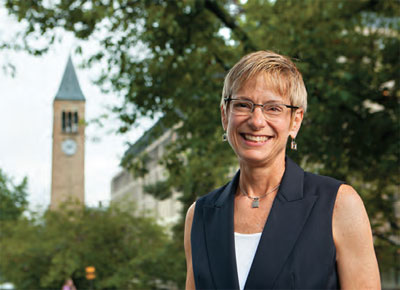 Faculty are the defining element of greatness in a university. They are the repository for and communicators of our enduring values, the engines of discovery, and educators committed to the next generation. Interactions with faculty are also what many alumni remember most fondly about their time at Cornell.
Faculty are the defining element of greatness in a university. They are the repository for and communicators of our enduring values, the engines of discovery, and educators committed to the next generation. Interactions with faculty are also what many alumni remember most fondly about their time at Cornell.
Alumni have told me time and again about beloved faculty members who made a difference in their lives. And because a Cornell experience inculcates a love of learning that is lifelong, many alumni continue to learn from the faculty in Cornell’s Adult University programs, through eCornell and MOOCs, at regional alumni events, and from on-campus lectures and symposia that alumni are welcome to attend.
In this and future Cornell Alumni Magazine columns, I will introduce you to some of our scholars, teachers, and mentors who are world-renowned experts and rising stars across the disciplines and colleges. It will be an eclectic mix of individuals whose research and creative work will give you a sense of what is possible because of outstanding faculty, within disciplines and across disciplines, at a place as intellectually rigorous and inventive as Cornell.
Take, for example, Avery August, PhD ’94, professor and chair of the Department of Microbiology and Immunology in the College of Veterinary Medicine, whose award-winning research aims to find new strategies to prevent allergies and asthma. With a doctorate from the Weill Cornell Graduate School of Medical Sciences—which honored him with its Distinguished Alumnus Award in May—Avery has intellectual ties to both our Ithaca and New York City campuses. In his current position, he uses animal models to understand how key cells in the immune system are activated to spark an allergic response, with the goal of spurring the development of new drugs for asthma and allergy sufferers.
I have also been intrigued by the work of Kim Haines-Eitzen, professor of Near Eastern studies and an expert on ancient monastic texts. I met her first through her book, The Gendered Palimpsest, which explores the role of women in producing and disseminating books during the early Christian era. (I have included it on my current “recommended” list for the Cornell Store.) Kim’s latest project, building on a knowledge of bioacoustics she gained at the Lab of Ornithology, involves recording natural sounds in Israel’s Sin Wilderness Valley and monasteries of the Judaean Desert as a way of understanding auditory imagery—from the wind as God’s voice to demons who roar or crash like thunder—in the ancient texts.
With a background that includes economics, geography, sociology, and anthropology, Wendy Wolford, Polson Professor of Development Sociology and faculty director of economic development programs in the Atkinson Center for a Sustainable Future, is contributing to our knowledge of land reform and ownership issues in Latin America, especially Brazil; such important change is a crucial element in reducing inequality in this region. Her work reveals why land reform remains the subject of intense conflict in Latin America, and provides a nuanced understanding for the many groups involved in the debate, from local grassroots organizations to the political and economic elite, from unions to the Catholic Church.
Faculty members like Avery, Kim, and Wendy contribute to Cornell’s global stature and demonstrate why renewing the faculty is a priority for the University. We need to hire assistant professors in areas of emphasis and excellence and to support and build our scholarly and creative faculty at the mid-stage of their careers. They are our institutional leaders, often at the most productive stage of their research and teaching, and the engines for Cornell’s ascent in excellence and recognition. Although our special collegial culture is a powerful incentive for recruiting and retaining faculty, we must compete aggressively against other major universities for top talent by also providing endowed chairs, funds for research and collaboration, fellowships for graduate students and postdoctoral associates, and other support. And, as always, our senior faculty help us build our academic ranks, continue to contribute to our community, and, even in retirement, often stay connected to the campus and our student body.
We aspire to nothing less than to make Cornell a global center for the very best researchers, scholars, and creative minds so that generations of students will continue to have the life-changing experiences that have long shaped the bond between alumni and the alma mater and have defined Cornell’s place in the world. I look forward to our partnership toward that goal.


